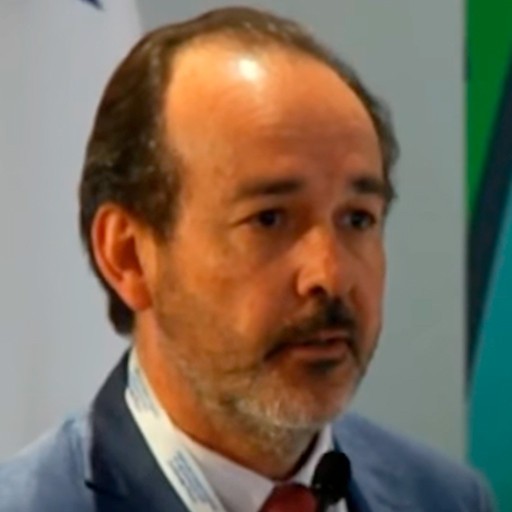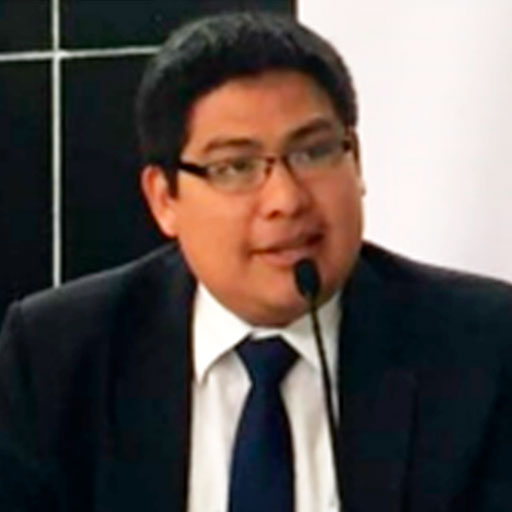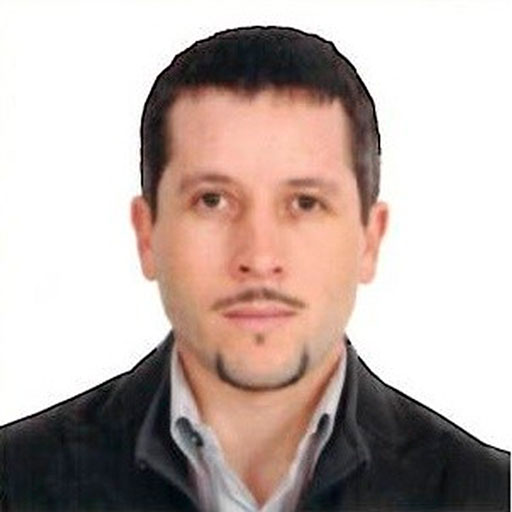Simposio - Hacia la erradicación de la Desnutrición Infantil Crónica en el Ecuador: una mirada longitudinal del problema
To contribute with relevant scientific input to the discussion on the issue of chronic child malnutrition in Ecuador, involving both international and national experts, in order to support the development of a sustainable public policy in Ecuador aimed at eradicating the problem.
- Participation in the event is completely free, but registration and enrollment are required.
- At the end of the symposium, a certificate of attendance for 22 hours will be awarded to those who have attended a minimum of 6 out of the 9 scheduled talks.
- We will have national and international guest speakers.
- Get involved, register, and contribute from your perspective to the eradication of chronic malnutrition in Ecuador.
Academic Coordinator: Fadya Orozco
Agenda
| Date and Time | Presentation | Speaker |
|---|---|---|
| Friday, June 3, 14:15 to 15:15 |
Progress in the indicator of stunting in Ecuador from 2000 to 2020: Walking towards 2030. Zoom: https://usfq.zoom.us/j/85722999147 |
Giovanna Gatica Domínguez International Nutrition Consultant at the World Health Organization in Geneva. |
| Friday, June 3, 15:15 to 16:15 |
Social and Economic Impact of Chronic Malnutrition: Results of a Study Conducted in Ecuador. Zoom: https://usfq.zoom.us/j/85722999147 |
Rodrigo Martínez, Senior Social Affairs Officer at the Division of Social Development of ECLAC. Amalia Palma, Research Assistant in the same Division. |
| Wednesday, June 8, 18:15 to 19:15 |
Factors Behind the Success Story of Combating Child Stunting in Peru: A Multilevel Ecological Analysis at the District Level. Zoom: https://usfq.zoom.us/j/83028499742 |
Carlos A. Huayanay-Espinoza Peruvian University Cayetano Heredia |
| Wednesday, June 8, 19:15 to 20:15 |
Child Malnutrition in Chile: Policies and Programs That Explain Its Eradication. Zoom: https://usfq.zoom.us/j/83028499742 |
Gerardo Weisstaub Institute of Nutrition and Food Technology, University of Chile. |
| Wednesday, June 15, 18:15 to 19:15 |
Child Malnutrition and the Double Nutritional Burden: Challenges for Ecuador towards the 2030 Agenda. Zoom: https://usfq.zoom.us/j/83028499742 |
Chris Melby Department of Food Science and Human Nutrition Colorado State University |
| Wednesday, June 15, 19:15 to 20:15 |
Changes in Magnitude and Trends of Chronic Malnutrition in Peru, Analysis of the Period 1996 to 2011. Zoom: https://usfq.zoom.us/j/83028499742 |
Juan Pablo Aparco National Institute of Public Health Peru |
| Wednesday, June 22, 18:15 to 19:15 |
Eggs in Early Complementary Feeding and Child Growth: Results of a Randomized Controlled Trial. Zoom: https://usfq.zoom.us/j/83028499742 |
Lora Iannotti Brown School Washington University |
| Wednesday, June 22, 19:15 to 20:15 |
Infant Nutritional Atlas: A Research and Nutritional Education Strategy in Early Childhood. Zoom: https://usfq.zoom.us/j/83028499742 |
Maribel Chisaguano Nutrition and Dietetics Career School of Public Health University of San Francisco de Quito |
| Wednesday, June 29, 18:15 to 19:15 |
Map of Territorial Indicators of Social Determinants of Child Chronic Malnutrition in Ecuador. Zoom: https://usfq.zoom.us/j/83028499742 |
Student of the Master of Public Health at USFQ |
| Wednesday, June 29, 19:15 to 20:15 |
Proposal for an Instrument to Align and Mobilize Fiscal Resources to Finance the Strategy Aimed at Preventing and Reducing Child Chronic Malnutrition in Ecuador. Zoom: https://usfq.zoom.us/j/83028499742 |
Mateo Villalba UNICEF- PUCE |
| Friday, July 1, 14:00 to 14:30 |
Closing Section of the Symposium - Towards the Eradication of Chronic Child Malnutrition in Ecuador: A Longitudinal Look at the Problem Zoom: https://usfq.zoom.us/j/84933089342 |
Giovanna Gatica Domínguez Rodrigo Martínez Amalia Palma Carlos Huayanay Espinoza Gerardo Weistaubb Chris Melby Juan Pablo Aparco Lora Iannotti Maribel Chisaguano Mateo Villalba |
Speakers
Session 1
Advancements in the height delay indicator in Ecuador from 2000 to 2020: Progress towards 2030.
Abstract: Based on data from the past twenty years, we assess the estimates of chronic malnutrition in children under five years of age, illustrating Ecuador's progress in achieving the 2030 Sustainable Development Goals (SDGs) since the year 2000. We emphasize ethnic disparities in this indicator when comparing it to other countries in the region while highlighting effective interventions recommended in The Lancet journal in 2021 concerning progress in maternal and child health.

Giovanna Gatica Domínguez
International Nutrition Consultant at the World Health Organization headquarters in Geneva
Dr. Giovanna Gatica Domínguez - a nutritionist from the University of San Carlos in Guatemala, holds a Master's degree in epidemiology from the Federal University of Pelotas, Brazil, and a Doctorate in Population Nutrition from the National Institute of Public Health in Mexico. She has worked as a Post-Doctoral researcher at the International Center for Health Equity, leading the nutrition team and publishing peer-reviewed articles in high-impact international journals. Currently, she is engaged in the Food Monitoring and Safety Unit at WHO headquarters in Geneva, where she is part of the Joint Estimates of Child Malnutrition group, comprising UNICEF-WHO-WB, which is instrumental in reporting countries' progress towards the SDGs, among other tasks.
Session 2
Social and Economic Impact of Chronic Malnutrition: Results of the Study Conducted in Ecuador.
Abstract: The combined impact of the double burden of malnutrition results in a net loss of 4.3% of the annual Gross Domestic Product (GDP). However, due to the ongoing high prevalence of malnutrition, its cost in terms of productivity loss represents a social and financial burden 1.5 to 3 times greater than that of overweight and obesity. These costs affect both the healthcare system and the affected families.

Rodrigo Martínez
Senior Social Affairs Officer at the Division of Social Development of ECLAC
Rodrigo Martínez, a Senior Social Affairs Officer at the United Nations Economic Commission for Latin America and the Caribbean (ECLAC). He is a sociologist with postgraduate studies in project evaluation from the University of Chile and over twenty-eight years of experience in research and technical assistance related to social institutionalism, social policy management, social expenditure, social protection, hunger, and malnutrition, among other areas. His publications include: "The Cost of Hunger: Analysis of the Social and Economic Impact of Child Malnutrition"; "Social and Economic Impact of the Double Burden of Malnutrition"; "Disasters and Inequality in a Prolonged Crisis"; "Social Institutionalism in Latin America and the Caribbean"; "Inclusive Social Protection in Latin America: A Comprehensive Perspective, a Rights-based Approach"; "Social Protection Instruments: A Comprehensive Perspective, a Rights-based Approach"; "Social Expenditure: Measurement and Analysis Model for Latin America and the Caribbean"; "Technological Revolution and Social Inclusion: Reflections on Challenges and Opportunities for Social Policy in Latin America."

Amalia Palma
Research Assistant in the same Division
Research Assistant at the Division of Social Development of ECLAC. She holds a Bachelor's degree in Economics from the University of Chile and a Master's degree in Social Policies in Developing Countries from the London School of Economics and Political Science (LSE) at the University of London. Since 2008, she has been working at ECLAC, collaborating on various projects related to malnutrition, cost analysis, social investment, social protection, and recently, the impact of digital era changes on social inclusion.
Session 3
Factors behind the success story against chronic malnutrition in children under five years in Peru: A multilevel ecological district analysis.
Abstract: The reduction in growth stunting can be attributed to the adoption of anti-poverty policies and the sustained implementation of equitable cross-cutting interventions, with a focus on the poorest areas. After a long period of stagnation, Peru drastically reduced its national and departmental prevalence of chronic malnutrition, thanks to a combination of social determinants and cross-cutting factors. This experience offers valuable lessons for other countries, including Ecuador.

Carlos A. Huayanay-Espinoza
Peruvian University Cayetano Heredia
Policy Design Coordinator at the Directorate of Policies for Quality Assurance in Higher University Education of the Ministry of Education. During 2019 and 2020, he was part of the technical team that designed the National Policy for Higher and Technical-Productive Education (PNESTP), approved in August 2022. Between 2018 and 2019, he worked as a team leader and in quality management issues at the National Superintendence of Higher University Education. In 2017, he served as Director of the Directorate of Policies for the Development and Assurance of Quality in Higher University Education at the Ministry of Education (MINEDU). Previously, he worked as a specialist in Monitoring and Evaluation Tools for Higher University Education at the Office of Strategic Planning and Budget of MINEDU and as an associate researcher at the Center for Comprehensive and Sustainable Development Research (CIDIS-UPCH). He earned a Master's degree in Epidemiological Sciences at the Peruvian University Cayetano Heredia and a Specialization in Public Investment (Pacific University).
Session 4
Child Malnutrition in Chile: Policies and Programs Explaining Its Eradication.
Abstract: Chile has consistently and dramatically reduced the prevalence of chronic child malnutrition from 37% to 2.9% over forty years. Several factors explain this favorable performance; however, the central element was the presence of a sustained state policy focused on the implementation of more appropriate policies and programs.

Gerardo Weisstaub
Institute of Nutrition and Food Technology, University of Chile
Pediatric Nutritionist. Master of Science in Nutrition. Full Professor at the Institute of Nutrition and Food Technology (INTA) and the Department of Pediatrics (Campus Centro), University of Chile.
Session 5
Child Malnutrition and the Double Nutritional Burden: Challenges for Ecuador towards the 2030 Agenda.
Abstract: Dietary patterns of the Andean population, especially in rural areas of Ecuador, favor the consumption of carbohydrates and processed foods at the expense of traditional diets, predisposing these populations to the consequences of a double nutritional burden.

Chris Melby
Department of Food Science and Human Nutrition
Colorado State University
Director of the Department of Food Science and Human Nutrition at Colorado State University. In 2015, he completed a Fulbright scholarship in Ecuador, where his research has focused on understanding the transition from ancestral dietary patterns to commercially prepared foods with high sugar, salt, and fat content (the Nutritional Transition) in urban and rural areas and its contribution to the double burden of malnutrition, obesity, and overweight in the Andean highlands.
Session 6
Changes in Magnitude and Trends of Chronic Malnutrition in Peru, Analysis from 1996 to 2011.
Abstract: Chronic malnutrition in Peru between 1996 and 2011 showed a decreasing trend and a significant reduction of 38%, with the most significant change occurring in the last six years. However, this reduction did not succeed in closing the social inequity gaps in malnutrition among vulnerable sectors. One of the key lessons from Peru's case emphasizes the development of strategies that prioritize equity-friendly policies.

Juan Pablo Aparco
National Institute of Public Health, Peru
Licensed Nutritionist. Master's in Public Nutrition. Specialist in Impact Assessment on Population, Health, and Nutrition by the National Institute of Public Health (INSP-Mexico) and MEASURE (USA). Researcher at the National Institute of Health (INS) in program and intervention evaluation in Food and Nutritional Security, Obesity, anemia, and malnutrition. Currently serving as the scientific editor of the Peruvian Journal of Experimental Medicine and Public Health (2022-2024). Also, a research professor at the National University of San Marcos. He has authored over 30 scientific publications on anemia, obesity, and the impact of nutrition interventions in indexed journals in SCOPUS and Web of Science. Peer reviewer for Peruvian and foreign scientific journals (Chile, Colombia, Costa Rica, and Cuba).
Session 7
Eggs in Early Complementary Feeding and Child Growth: Results from a Randomized Controlled Trial.
Abstract: The early introduction of eggs significantly improves growth in young children. Generally accessible to vulnerable groups, eggs have the potential to contribute to global goals for reducing growth stunting.

Lora Iannotti
Brown School
Washington University
Lora Iannotti is an associate professor of public health at Washington University in St. Louis and director of the E3 Nutrition Lab, working to identify environmentally sustainable, developmentally appropriate, and economically viable nutrition solutions worldwide. She has expertise in maternal and child nutrition and poverty-related nutritional deficiencies and infectious diseases. Iannotti leads projects in Haiti, Ecuador, Haiti, and Kenya, collaborating with local partners to test innovative and interdisciplinary approaches using animal-source foods and small-scale fisheries and livestock development. Iannotti received her doctorate from the Bloomberg School of Public Health at Johns Hopkins University. She serves as a technical advisor on global policy initiatives with WHO, FAO, and USAID Feed the Future Fish Innovation Lab.
Session 8
Child Nutritional Photographic Atlas: A Research and Nutritional Education Strategy in Early Childhood.
Abstract: Having standardized tools that provide information about the portion sizes consumed by the child population allows for accurate data on diet composition and diversity. This, in turn, aids in designing and strengthening nutrition education, counseling, and monitoring programs. This presentation introduces the tool developed for the Ecuadorian population.

Maribel Chisaguano
Nutrition and Dietetics Program
School of Public Health-University of San Francisco de Quito
Master's in Nutrition and Metabolism, and PhD in Food and Nutrition from the University of Barcelona. Currently a lecturer in the Nutrition program at the University of San Francisco de Quito. She has published over 15 scientific articles on maternal and child nutrition in high-impact journals in the field of Human Nutrition and Nutrigenetics (PlosOne, Clinical Nutrition, Pediatric Research). She has also presented more than 10 papers at international conferences. Her main research projects include: The Photographic Manual of Food Portions for Dietary Quantification in the Ecuadorian Adult and Child Population; Development of a food exchange list for the Ecuadorian population; Assessment of health and nutrition conditions post-earthquake in the La Punta community, Ecuador; and Study of the influence of maternal nutrition and genetics on fetal adipose tissue development, in collaboration with researchers from Spain.
Session 9
Proposal for an Instrument to Align and Mobilize Fiscal Resources to Finance the Strategy Aimed at Preventing and Reducing Chronic Child Malnutrition in Ecuador.
Abstract: Presents an economic analysis of fiscal performance for the prevention and reduction of chronic child malnutrition (CCM), its limitations, and potential public policy instruments that could increase (mobilize or align) public resources to finance the strategy for the prevention and reduction of CCM.

Mateo Villalba
UNICEF - PUCE
Economist from PUCE and Master in Economics from FLACSO, where he has also pursued doctoral studies in Development Economics. With over 15 years of experience in development economics, particularly in the fields of economic policy, public investment, public finance, and monetary and financial sector. He has participated in and led multidisciplinary teams that have achieved various achievements at different times, including improving the amount, quality, and impact of social investment; fiscal consolidation and the introduction of fiscal framework rules; the reopening of the international capital market for Ecuador in 2005; linking national planning and the General State Budget to enhance public investment; the recovery and stabilization of international reserves to ensure the sustainability of the monetary system; reopening of the international capital market for Ecuador in 2014; improvement and expansion of the national payment system and electronic payment methods; and the consolidation of the financial information collection system for the supervision and control of mutuals and credit unions, among other achievements.

